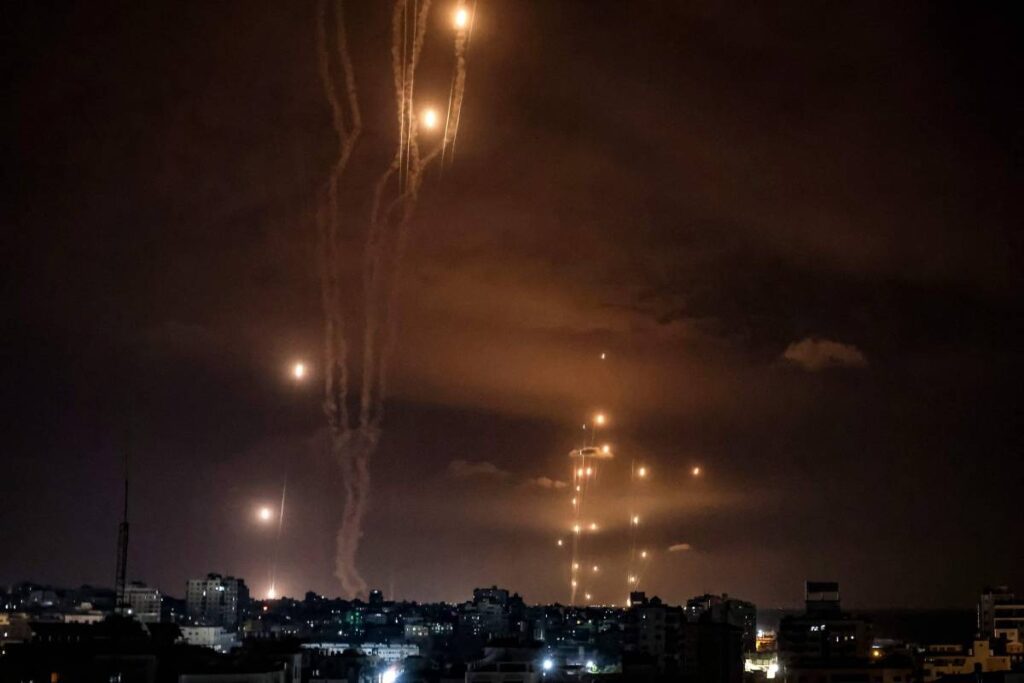Israeli-Palestinian Conflict Escalation: Unraveling the Complex Dynamics
Introduction: Israeli-Palestinian
In a shocking turn of events, Israeli forces clashed with Hamas gunmen, marking one of the deadliest days of violence in Israel in the last 50 years. This unexpected assault, launched by Hamas, resulted in nearly 500 casualties, throwing the region into chaos. The ramifications of this clash extend beyond immediate casualties, posing a significant threat to U.S-backed efforts to establish regional security alignments and complicating Palestinian aspirations for statehood.
Unprecedented Attack by Hamas
Hamas, the Palestinian militant group, initiated the attack with a massive barrage of rockets into southern Israel. This strategic move provided cover for a multi-pronged infiltration of fighters into Israel from Gaza, home to 2.3 million Palestinians. The incursion resulted in the deaths of at least 250 Israelis, with dozens taken hostage and Hamas fighters retreating back into Gaza.
Escalation in the West Bank: Israeli-Palestinian
Simultaneously, violence between Israel and Palestinian militants intensified in the Israeli-occupied West Bank. Here, a Palestinian authority, opposed by Hamas, exercises limited self-rule. The West Bank has witnessed increased Israeli raids, Palestinian street attacks, and assaults by Jewish settlers on Palestinian villages, exacerbating conditions for Palestinians under Netanyahu’s hard-right government. The stagnation of peacemaking efforts has left the region in a volatile state.
- The Prime Minister declares that Israel is in a state of war following an assault from Gaza that resulted in the death of 70 people.
- Iran Foreign Ministry Affirms: Hamas Attacks Signal ‘Confidence.
Hamas’ Warning and Motivation
Hamas leader Ismail Haniyeh, in a stern speech, declared that the assault initiated in Gaza would spread to the West Bank and Jerusalem. Gazans, living under an Israeli blockade for 16 years, face dire circumstances. Haniyeh emphasized the threats to Jerusalem’s Al-Aqsa Mosque, the enduring blockade on Gaza, and Israel’s normalization with countries in the region. The grievances expressed include the longstanding Palestinian refugee crisis, adding fuel to the already intense conflict.
Devastating Impact on Civilians
The streets of Sderot in southern Israel near Gaza tell a tale of tragedy, with bodies of Israeli civilians strewn across broken glass. The terror experienced by Israelis, barricaded into safe rooms, was vividly recounted on live television. Senior military officers were among those killed in the intense fighting near Gaza, amplifying the gravity of the situation.
Netanyahu’s Response
Prime Minister Benjamin Netanyahu’s office announced measures to cripple the military and governmental capabilities of Hamas and another militant group, Islamic Jihad, for an extended period. These measures include cutting electricity, fuel supplies, and restricting the entry of goods into Gaza. The Israeli military’s retaliatory strikes in Gaza left a trail of destruction, with black smoke, orange flashes, and sparks lighting the sky from explosions.
Global Response and Political Implications
The international community, led by the United States, denounced the attack. President Joe Biden affirmed Israel’s right to defend itself and issued a stern warning to Iran and other nations against exploiting the situation. The United States, actively pursuing a deal to normalize ties between Israel and Saudi Arabia, faces challenges as Palestinians fear potential compromises on their quest for an independent state.

Regional Demonstrations and Support for Hamas
Across the Middle East, demonstrations erupted in support of Hamas, with Israeli and U.S. flags set on fire. Protesters waving Palestinian flags were seen in Iraq, Lebanon, Syria, and Yemen. Iran and Hezbollah, Iran’s Lebanese allies, praised the Hamas attack, reflecting the complex geopolitical dynamics at play.
- “Israel Faces Unprecedented Challenge: Global Leaders Unite in Solidarity Against Recent Hamas Attack”.
- Decoding the Hamas Attack on Israel: Unraveling the Unprecedented Assault
Hamas’ Claims and Captives
Hamas deputy chief Saleh al-Arouri revealed that the group was holding a significant number of Israeli captives, including senior officials. He asserted that Hamas had enough captives to compel Israel to release all Palestinians in its jails. The attack, according to Hamas, was a response to escalated Israeli attacks on Palestinians in the West Bank, Jerusalem, and Israeli prisons.
Intelligence Failure and Unforeseen Consequences: Israeli-Palestinian
The unexpected nature of the attack left Israel completely off guard, marking one of the worst intelligence failures in its history. This shock to a nation that prides itself on intensive infiltration and monitoring of militants underscores the complexity of the situation.
In conclusion, the Israeli-Palestinian conflict has reached a critical juncture with the recent escalation. The intricate web of historical grievances, geopolitical alliances, and regional aspirations has led to a situation that demands careful consideration and international intervention to prevent further devastation.